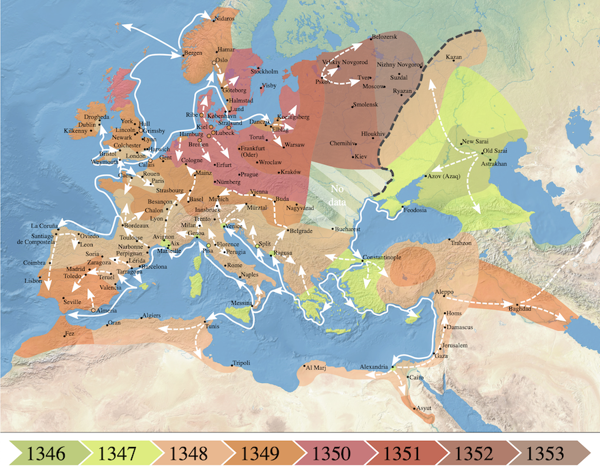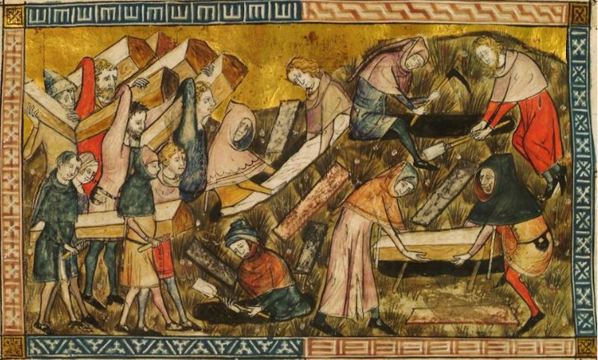
Is there a genetic reason some people survived the plague during the middle ages?
May 12, 2004

- Related Topics:
- Genetic variation,
- Gene expression,
- Mutation,
- Population genetics
A curious adult from California asks:
"Is there a genetic reason some people survived the plague during the middle ages?"
There may be. There are many stories where someone who was in constant contact with plague victims didn't die. Maybe genetics is the explanation.
For example, in 1665, the plague hit a small village in England called Eyam. The town quarantined itself to keep the Black Death from spreading into the rest of the country. A year later, the plague had burnt itself out but half of the townspeople were dead. Was there something special about the half that lived?

In 1996, researchers tracked down descendants of the people of Eyam and looked for any mutations they might have in common to explain this high survival rate. What they found was a mutation called CCR5-delta 32.
The CCR5-delta 32 mutation was already known for a different reason -- people with one copy of the CCR5-delta 32 mutation are resistant to HIV, the virus that causes AIDS. People with 2 copies are virtually immune to HIV. The CCR5-delta 32 mutation probably arose a few thousand years ago in Northeastern Europe. It stayed rare until around 700 years ago when it suddenly became more common. That’s right around when the plague started in Europe.
So, does CCR5-delta 32 protect people from the plague bacteria? Probably not. Mice infected with the plague bacteria died at around the same rates whether or not they had the CCR5-delta 32 mutation.

Why then is this mutation so common in Europeans and even more common in people whose ancestors came from Eyam?
Maybe smallpox is the reason. Smallpox killed 3 in 10 infected people for thousands of years in Europe. Recent studies suggest that smallpox, like HIV, can't infect someone with the CCR5-delta 32 mutation.
Of course this doesn't explain Eyam (unless there was a lot of smallpox in the area). A more controversial theory is that an unknown virus, not the plague bacteria, caused the Black Death. Besides the evidence of the CCR5-delta 32 mutation itself, some people contend that the disease shouldn't have been stopped by quarantine and that it spread too quickly for a flea borne illness. That’s why some people think it might not have been the plague in Eyam after all.
Anyway, as you can see, while genetics were probably involved, there isn't yet a solid answer as to what genes might have helped people survive the plague.

Author: Dr. Barry Starr
Barry served as The Tech Geneticist from 2002-2018. He founded Ask-a-Geneticist, answered thousands of questions submitted by people from all around the world, and oversaw and edited all articles published during his tenure. AAG is part of the Stanford at The Tech program, which brings Stanford scientists to The Tech to answer questions for this site, as well as to run science activities with visitors at The Tech Interactive in downtown San Jose.
 Skip Navigation
Skip Navigation
